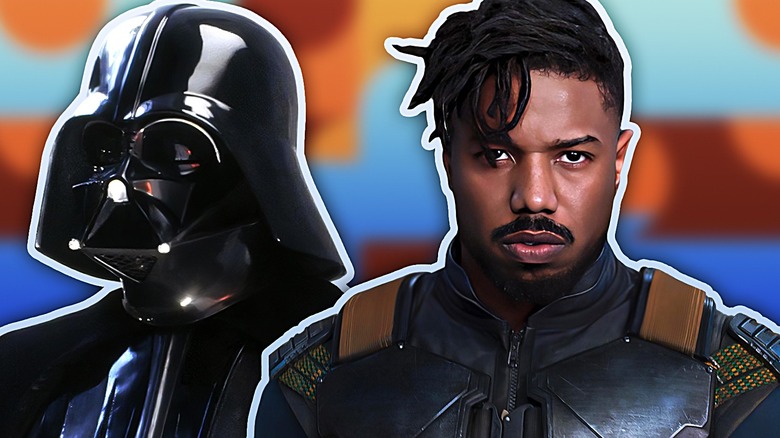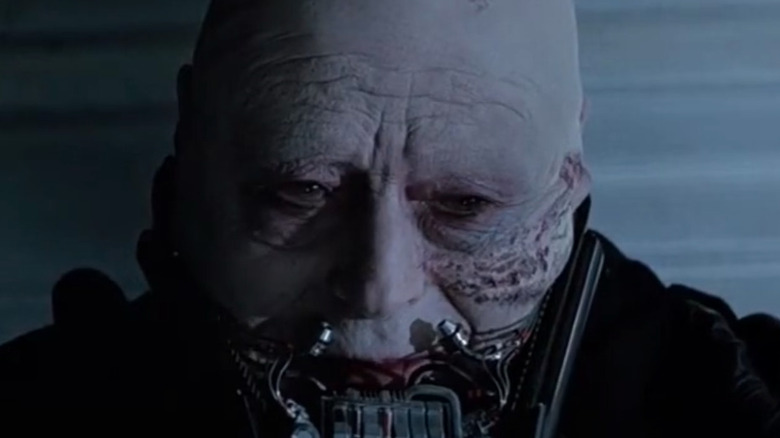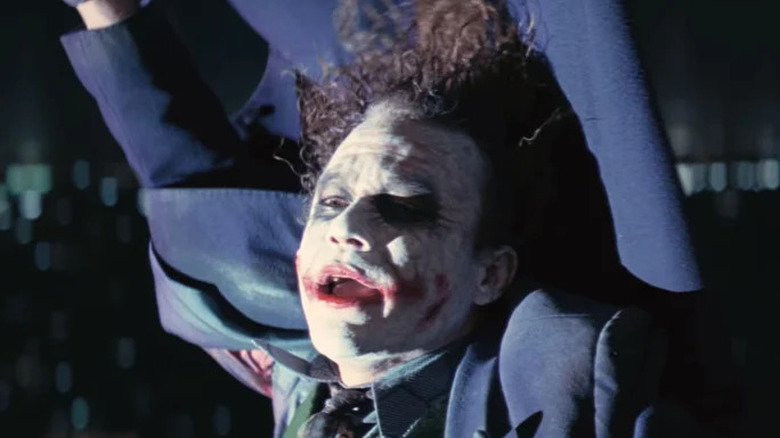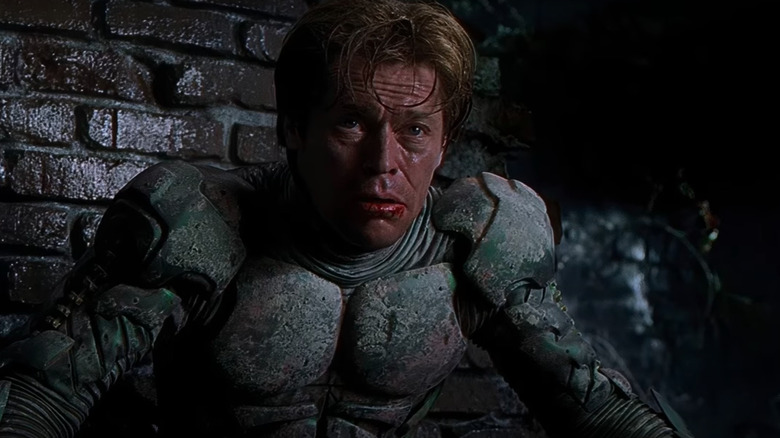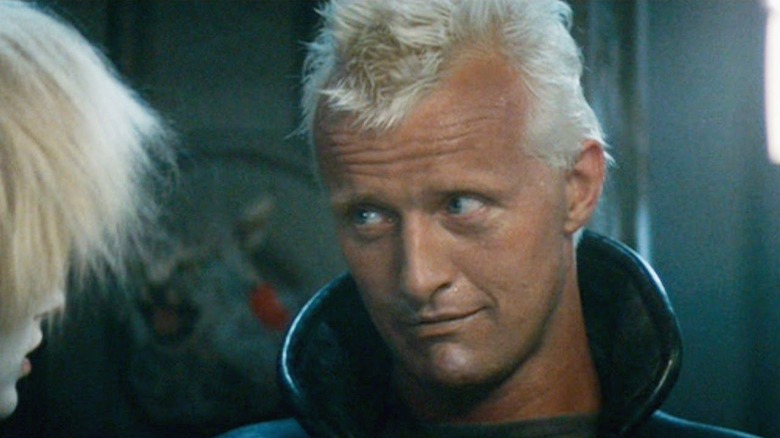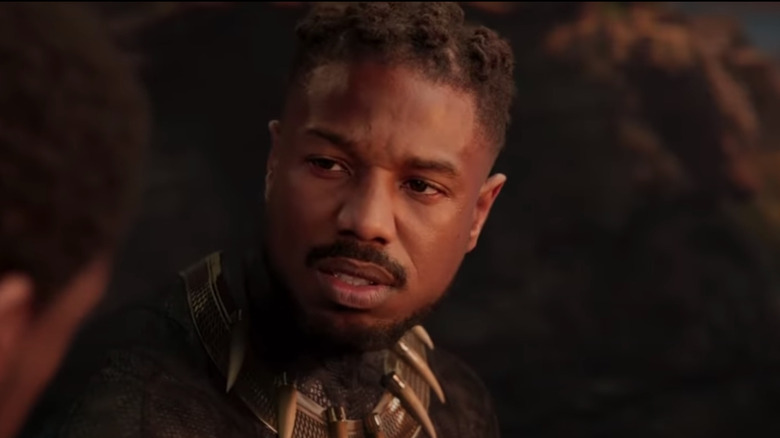The Best Last Words Of The Worst Movie Villains & How They Changed Everything
Last words are arguably just as important as first impressions, especially for a movie villain. The requisite dramatic introduction scene is all fine and well, but the audience goes into a movie with the expectation that the antagonist is going to lose at some point, so the film should make the moment count.
There are many villains out there with good last words that are memorable, clever, and highly quotable. This article isn't about them. This is about great last words — ones that not only impress the viewer and make them think, but that actually manage to change the entire movie in a surprisingly profound way. This may seem like a pretty tall order, but a good few films have managed to find a way to pull it off. Let's take a look at the movie villains whose last words were so great that they turned the entire movie on its head.
Darth Vader - Return of the Jedi
"Star Wars: Episode VI -– Return of the Jedi" ends Anakin "Darth Vader" Skywalker's (David Prowse, James Earl Jones, and Sebastian Shaw) chronological story — at least, unless you count stuff like Anakin's Force ghost in "Ahsoka." Vader gets the mother of all entrances in "Star Wars: Episode IV — A New Hope," and goes on to do many big, bombastic things across three big, bombastic movies. As such, it's oddly fitting that his final line in "Return of the Jedi" is a muted, unmasked moment that completes the character's redemption. "Tell your sister — you were right about me," he says to Luke Skywalker (Mark Hamill) with his last breath.
"Star Wars" fans know the score here. This is Vader finally admitting what he's been holding back: That Luke is right about Anakin Skywalker still being there, buried deep within the towering Sith lord's literally and metaphorically hard shell. By this time, there have been signs. Vader has expressed interest in joining forces with Luke on the Sith side of things, and of course, he just threw his evil boss Palpatine (Ian McDiarmid) into a pit to save his son. However, his last words fully confirm that the Anakin side still exists like Luke suspected, to the point that he specifically asks Luke to tell Leia (Carrie Fisher) as well.
Before this line, it's still more or less possible to view Darth Vader as an implacable fury monster whose only two emotions are fiery rage and barely contained seething. After you've heard it, though, it's hard to rewatch the movies without acknowledging the constant, pained inner conflict that fuels his anger. Darth Vader was already one of the finest sci-fi villains ever created, but this one line infuses him with nuance to spare.
Joker - The Dark Knight
Whenever Batman movies are ranked, there's a decent chance that the second installment in Christopher Nolan's trilogy "The Dark Knight" fares extremely well. A large part of its allure is Heath Ledger's nigh-impossibly prepared Joker, who's unlike any other incarnation of the character fans have seen. The first time viewers see him in full Joker regalia is the classic pencil-disappearing scene, so it's not exactly shocking that he also delivers in his final lines, where he brags to Batman (Christian Bale) how easily he corrupted Harvey Dent (Aaron Eckhard).
"I took Gotham's white knight and I brought him down to our level," the Joker says. "It wasn't hard. You see, madness, as you know, is like gravity. All it takes is a little push! Ha! Ha! Ha!"
And that's how the viewer finds out what the movie has been about all along. Throughout "The Dark Knight," the Joker's stated motivations have been highly chaotic, while his actual actions have been ... well, also chaotic, but executed with military-like precision that would make any tactician proud. Fighting Batman, burning a giant stack of money, setting up a huge, explosive test-of-faith game between two ferries, all that jazz? It was all just a part of his actual plan, which was to show just how close every single person is to the kind of madness he and Batman already embrace.
The ferry plan falls through? Big whoop, here's Harvey Dent, now fully turned into a supervillain. Revealing that the whole movie has essentially been the bad guys' take on the "all it takes is one bad day" philosophy from the ending of "Batman: The Killing Joke" is a wild last-minute flex — but then again, what else would you expect from the Joker?
Norman Osborn - Spider-Man
Willem Dafoe's Norman Osborn has established himself as one of the best superhero movie villains not once, but twice. Before he returned in "Spider-Man: No Way Home" to terrorize Tom Holland's version of the hero, he was already a known commodity after doing the same to Tobey Maguire's Spidey in 2002's "Spider-Man." Norman's superpowered alter ego, Green Goblin, is essentially a nefarious split personality that his serum brings to the forefront, and for much of the 2002 movie, it seems to have swallowed the original, mellow Norman whole ... that is, until the character's final line. "Peter, don't tell Harry," he requests with his last words after getting skewered by his own glider.
Despite the similar redemption framing, what Norman asks here is the opposite of Darth Vader's final line, delivered with an extra twist. He knows he's turned into a monster, and begs Spider-Man to keep it secret from his son, Harry Osborn (James Franco). The implication is that Norman is still there, and manages to regain his humanity in his final moments. This appears to confirm what the two personalities' dialogue earlier in the film implies: That the Green Goblin is a separate monster identity, and Norman is still Norman.
The trick is that instead of fully confirming the redemption, the Goblin's last line has room for interpretation. Has Norman been peering helplessly through the Goblin's eyes during his rampage, only getting some last words in because his evil persona perished first? Or is the Goblin still pretending to be old Norman like he had done moments prior, deciding to use his last breath to mess with Spidey some more? That's the kind of food for thought viewers wouldn't have if it wasn't for the character's final line.
Roy Batty - Blade Runner
The "Tears in Rain" monologue has its own Wikipedia entry. There's probably a whole bunch of cinephiles who can recite it in their sleep. Still, in the interest of full coverage, here's what replicant Roy Batty (Rutger Hauer) tells Rick Deckard (Harrison Ford) just before his pre-programmed lifespan ends. "I've seen things you people wouldn't believe," Batty says, full of poignant pauses and resigned intensity. "Attack ships on fire off shoulder of Orion. I watched C-beams glitter in the dark near the Tannhäuser Gate. All those moments will be lost in time, like tears in rain. Time to die."
The powerful, artificial replicants are the hot potato of "Blade Runner." Deckard hunts them, Roy is first among the rogue ones, and Rachael (Sean Young) muddies the waters by being a replicant who believes she's human. Even without getting into the whole shebang about Deckard potentially being a replicant himself, the movie has a ton of morality questions for the viewer to chew on ... but when the supposed antagonist uses his last moments of expiring life cycle to save the blade runner hunting him from a certain doom and speak those words to him, a great many questions about the replicants' capacity for humanity are solved.
All credit to Hauer for delivering an all-time great monologue, but a special mention must go to Ford for portraying Deckard desperately trying to comprehend the dangerous opponent who just unexpectedly rescued him and is now laying out some serious truth bombs. This is the face of a man who's questioning everything he knows and has just started to realize it was all wrong — and it might just closely resemble the face of a viewer who sees the scene for the first time.
Erik Killmonger - Black Panther
There are many reasons why "Black Panther" is the Marvel Cinematic Universe movie with the best Rotten Tomatoes score, from the late, great Chadwick Boseman to the intricate world-building of Wakanda and ... well, everything. Still, even the best movie requires a great villain to truly work, so it's a good thing "Black Panther" has one of the best MCU movie villains, Erik Killmonger (Michael B. Jordan), at its disposal.
An orphaned boy who turned into a powerful soldier with a mission to overcome the faraway country that killed his father and use its powers to fight racists, Killmonger is one switched viewpoint and some overly cruel and dominating tendencies away from being the hero of the story, and the film wisely allows him to make enough convincing points to underline where he comes from. His final line after his defeat to T'Challa (Boseman) brings things to a level no one in the movie can truly answer.
"Bury me in the ocean, with my ancestors that jumped from the ships, because they knew death was better than bondage," Killmonger tells T'Challa, defiant to the end and invoking the dark history of slave trade as he dies. Some other lines on this list make it possible to say something back, regardless of whether the characters actually choose to do so or not. T'Challa doesn't even try, because how can you reply to a curtain call like that?
It's worth noting that while T'Challa has been aware of Killmonger's backstory before this moment, he may not have fully understood just what kind of man his enemy is. By the time he witnesses Killmonger utter that line and deliberately draw the blade out of his chest to die as a free man, it's safe to say that he does.
